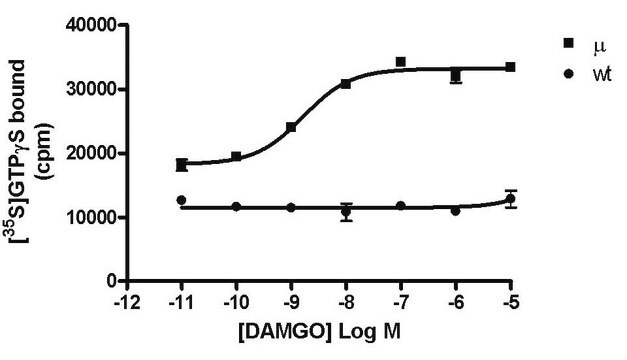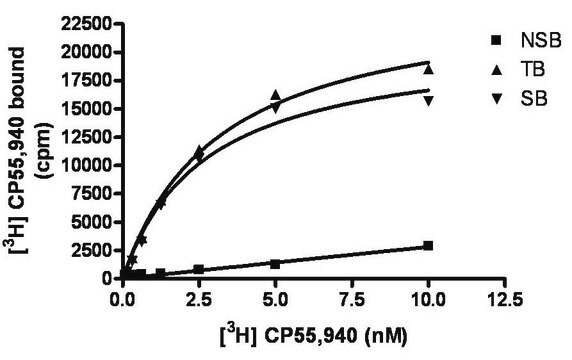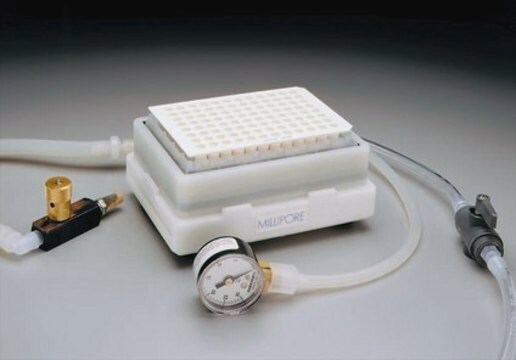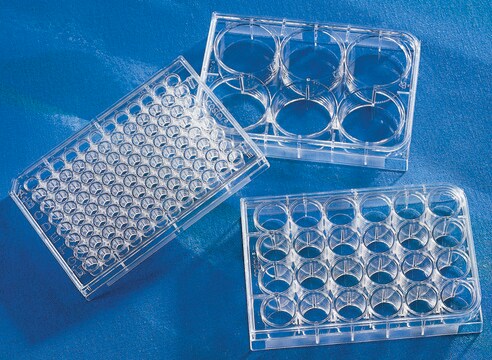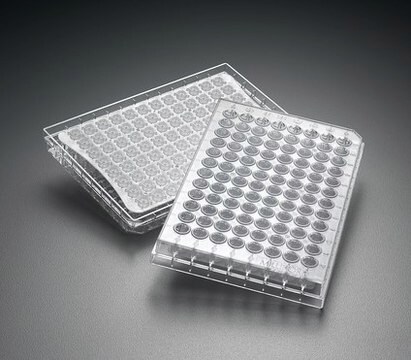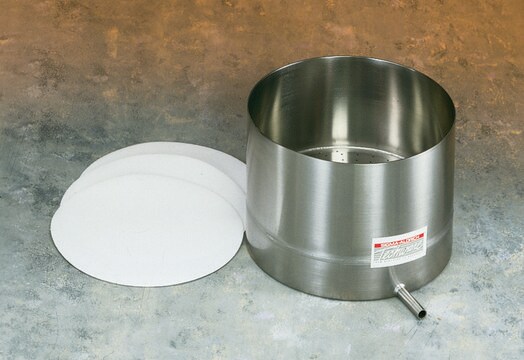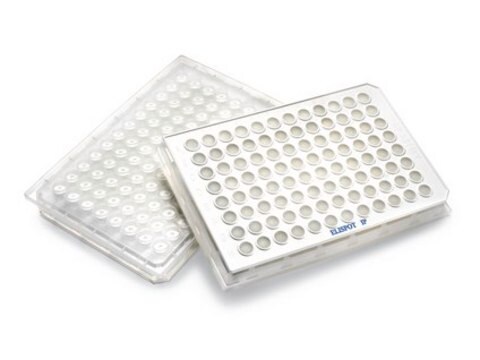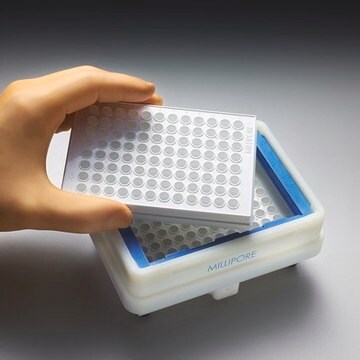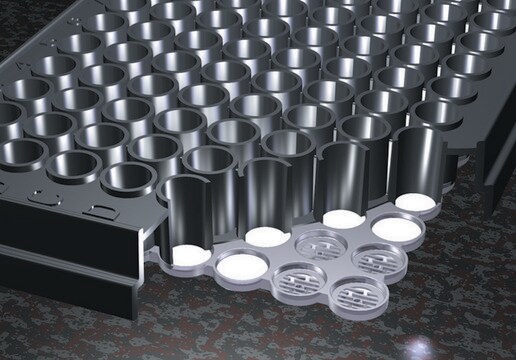HTS019M
ChemiSCREEN CB1 Membrane Preparation
Human CB1 GPCR membrane preparation for Radioligand binding Assays & GTPγS binding.
Sinonimo/i:
CB1 GPCR-expressing membrane prep
Autenticatiper visualizzare i prezzi riservati alla tua organizzazione & contrattuali
About This Item
Codice UNSPSC:
41106514
eCl@ss:
32161000
NACRES:
NA.41
Prodotti consigliati
Origine biologica
human
Livello qualitativo
Ricombinante
expressed in Chem-1 cells
Produttore/marchio commerciale
ChemiScreen
Chemicon®
Concentrazione
1.0 mg/mL
tecniche
ligand binding assay: suitable (GTPγS)
radioligand binding assay (RLBA): suitable
N° accesso NCBI
N° accesso UniProt
Condizioni di spedizione
dry ice
Descrizione generale
CB1 is a GPCR that is expressed primarily in brain and nervous tissue, and mediates numerous CNS responses such as analgesia, appetite, cognition, memory and locomotor activity. A number of cannabinoid ligands bind to CB1 and activate Gi/o-mediated downstream responses, including inhibition of cAMP production and activation of ion channels and MAP kinases. Ligands for CB1 include exogenous agonists such as Delta9-THC, the main psychoactive component of the plant Cannabis sativa, and endogenous eicosanoid agonists such as anandamide. A number of synthetic agonists such as CP55940 and R-(+)-WIN55212, and antagonists, such as SR141716A, for CB1 have been developed (Howlett et al., 2002). CB1 agonists have clinical utility in analgesia and antiemetic properties, whereas CB1 antagonists show promise for treatment of appetite in obesity disorders. Chemicon′s CB1 membrane preparations are crude membrane preparations made from our proprietary stable recombinant cell lines to ensure high-level of GPCR surface expression; thus, they are ideal HTS tools for screening for agonists and antagonists at CB1. The membrane preparations exhibit a Kd of 7 nM for [3H]-SR141716A. In the presence of 2 nM [3H]-SR141716A with CP55940 as unlabeled competitor, 5 μg/well and 10 μg/well CB1 Membrane Prep yield 4- and 5-fold signal-to-background ratios, respectively.
Human CB1
Applicazioni
Human CB1 GPCR membrane preparation for Radioligand binding Assays & GTPγS binding.
Radioligand binding assay, and GTPγS binding.
Azioni biochim/fisiol
GPCR Class: A
Protein Target: CB1
Target Sub-Family: Cannabinoid
Qualità
SPECIFICATIONS:
1 unit = 10 μg
Bmax: 15 pmol/mg
Kd: 7 nM for SR141716A
1 unit = 10 μg
Bmax: 15 pmol/mg
Kd: 7 nM for SR141716A
Specifiche
Inucbation Conditions
RECOMMENDED ASSAY CONDITIONS: Membranes are mixed with radioactive ligand and unlabeled competitor (see Figures 1 and 2 for concentrations tested) in binding buffer in a nonbinding 96-well plate, and incubated for 1-2 h. Prior to filtration, a GF/C 96-well filter plate is coated with 0.33% polyethyleneimine for 30 min, then washed with 50mM HEPES, pH 7.4, 0.5% BSA. Binding reaction is transferred to the filter plate, and washed 3 times (1 mL per well per wash) with Wash Buffer. The plate is dried and counted.
Binding buffer: 50 mM Hepes, pH 7.4, 5 mM MgCl2, 1 mM CaCl2, 0.2% BSA, filtered and stored at 4°C. Ligands were diluted in binding buffer containing 30% DMSO, then added to membranes such that the final DMSO concentration was 15%.Radioligand: [3H] SR141716A (Amersham #TRK1028)
Wash Buffer: 50 mM Hepes, pH 7.4, 500mM NaCl , 0.1% BSA, filtered and stored at 4°C.
One vial contains enough membranes for at least 200 assays (units), where an unit is the amount of membrane that will yield approximately 4-fold signal:background with [3H] SR141716A at 2 nM
RECOMMENDED ASSAY CONDITIONS: Membranes are mixed with radioactive ligand and unlabeled competitor (see Figures 1 and 2 for concentrations tested) in binding buffer in a nonbinding 96-well plate, and incubated for 1-2 h. Prior to filtration, a GF/C 96-well filter plate is coated with 0.33% polyethyleneimine for 30 min, then washed with 50mM HEPES, pH 7.4, 0.5% BSA. Binding reaction is transferred to the filter plate, and washed 3 times (1 mL per well per wash) with Wash Buffer. The plate is dried and counted.
Binding buffer: 50 mM Hepes, pH 7.4, 5 mM MgCl2, 1 mM CaCl2, 0.2% BSA, filtered and stored at 4°C. Ligands were diluted in binding buffer containing 30% DMSO, then added to membranes such that the final DMSO concentration was 15%.Radioligand: [3H] SR141716A (Amersham #TRK1028)
Wash Buffer: 50 mM Hepes, pH 7.4, 500mM NaCl , 0.1% BSA, filtered and stored at 4°C.
One vial contains enough membranes for at least 200 assays (units), where an unit is the amount of membrane that will yield approximately 4-fold signal:background with [3H] SR141716A at 2 nM
Stato fisico
Liquid in packaging buffer: 50 mM Tris pH 7.4, 10% glycerol and 1% BSA no preservatives.Packaging method: Membranes protein were adjusted to 0.5 mg/ml in 1 ml packaging buffer, rapidly frozen, and stored at -80°C.
Stoccaggio e stabilità
Maintain frozen at -70°C for up to 2 years. Do not freeze and thaw.
Note legali
CHEMICON is a registered trademark of Merck KGaA, Darmstadt, Germany
Esclusione di responsabilità
RESEARCH USE ONLY. This product is regulated in France when intended to be used for scientific purposes, including for import and export activities (Article L 1211-1 paragraph 2 of the Public Health Code). The purchaser (i.e. enduser) is required to obtain an import authorization from the France Ministry of Research referred in the Article L1245-5-1 II. of Public Health Code. By ordering this product, you are confirming that you have obtained the proper import authorization.
Unless otherwise stated in our catalog or other company documentation accompanying the product(s), our products are intended for research use only and are not to be used for any other purpose, which includes but is not limited to, unauthorized commercial uses, in vitro diagnostic uses, ex vivo or in vivo therapeutic uses or any type of consumption or application to humans or animals.
Unless otherwise stated in our catalog or other company documentation accompanying the product(s), our products are intended for research use only and are not to be used for any other purpose, which includes but is not limited to, unauthorized commercial uses, in vitro diagnostic uses, ex vivo or in vivo therapeutic uses or any type of consumption or application to humans or animals.
Codice della classe di stoccaggio
10 - Combustible liquids
Classe di pericolosità dell'acqua (WGK)
WGK 2
Certificati d'analisi (COA)
Cerca il Certificati d'analisi (COA) digitando il numero di lotto/batch corrispondente. I numeri di lotto o di batch sono stampati sull'etichetta dei prodotti dopo la parola ‘Lotto’ o ‘Batch’.
Possiedi già questo prodotto?
I documenti relativi ai prodotti acquistati recentemente sono disponibili nell’Archivio dei documenti.
Il team dei nostri ricercatori vanta grande esperienza in tutte le aree della ricerca quali Life Science, scienza dei materiali, sintesi chimica, cromatografia, discipline analitiche, ecc..
Contatta l'Assistenza Tecnica.